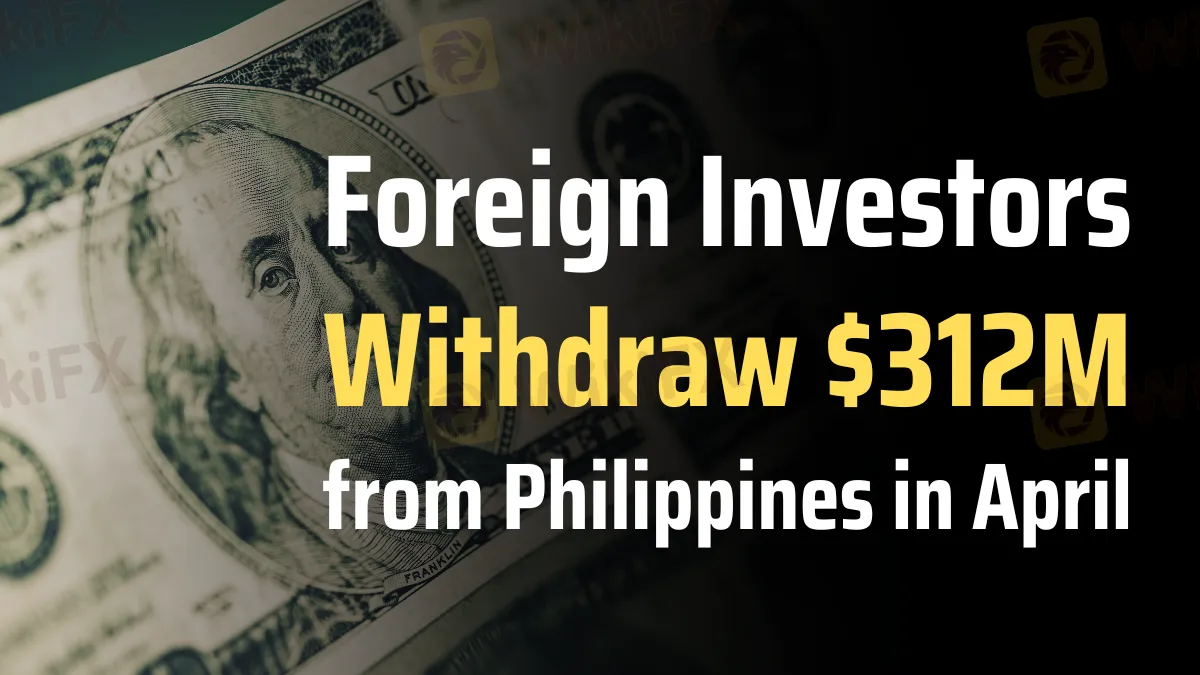简体中文
繁體中文
English
Pусский
日本語
ภาษาไทย
Tiếng Việt
Bahasa Indonesia
Español
हिन्दी
Filippiiniläinen
Français
Deutsch
Português
Türkçe
한국어
العربية
Foreign Investors Withdraw $312M from Philippines in April
Abstract:Foreign investors pulled $312M from the Philippines in April, a rise from March's $236M, says BSP. However, net inflows were seen over the first four months.

In April 2024, the Philippines suffered a substantial outflow of foreign portfolio investments, sometimes known as “hot money,” with net withdrawals totaling $312 million. This amount, announced by the Bangko Sentral ng Pilipinas (BSP), is up from the $236 million net outflows recorded in March. Despite the monthly rise, the year-on-year comparison reveals that net outflows are down from $352 million in April 2023.
The phrase “hot money” refers to foreign funds that are briefly invested in stocks and money markets to profit from short-term profits. The transactions involving these assets, which are registered via authorized agent banks (AABs), indicated total outflows of $1.2 billion and gross inflows of $914 million in April 2024.
When viewed over a longer period of time, the BSP data revealed a mixed picture. In the first four months of 2024, the Philippines received net inflows of $65 million. This is a significant increase from the $680 million net outflows over the same time in 2023.
Of the $914 million in registered investments for April, 59.5%, or $544 million, went to Philippine Stock Exchange-listed stocks. The remaining 40.5%, or $370 million, was invested in peso-backed securities. The bulk of these investments came from the United States, the United Kingdom, Singapore, Luxembourg, and Hong Kong, accounting for 87.9% of the total inflows.

In April, gross withdrawals were $1.2 billion, a 25.4% decline from $1.6 billion in March. The United States was the biggest beneficiary of these outflows, receiving $527 million, or 43% of total external remittances.
The statistics revealed that registered investments increased by 28.2% year on year, from $713 million in April 2023 to $914 million in April 2024. Simultaneously, gross outflows increased 15.1% from $1.1 billion the previous year.
The BSP's guidelines on foreign currency transactions make declaring inbound foreign investments via AABs optional. However, it becomes important if the investor intends to acquire foreign currency from AABs or their subsidiary/affiliate foreign exchange firms in order to repatriate money and remit profits. Without such registration, foreign investors may still repatriate cash and remit profits, but the foreign currency must be obtained outside of the banking system.
Despite the hard month of April, the overall foreign investment picture for the year to date has been favorable, with net inflows signaling a possible rebound and restoring confidence in the Philippine market. The central bank's surveillance, as well as the changing dynamics of global financial movements, continue to shape the country's investment climate.
Also, check the latest news on the financial market here.

Disclaimer:
The views in this article only represent the author's personal views, and do not constitute investment advice on this platform. This platform does not guarantee the accuracy, completeness and timeliness of the information in the article, and will not be liable for any loss caused by the use of or reliance on the information in the article.
Read more

Solana Soars to All-Time High, Hits $264 on Coinbase
Solana hits $264 on Coinbase, breaking its 3-year high with an 11% daily surge. Learn what’s driving SOL's meteoric rise and the crypto market rally.

FCA Identifies Clone Firm Exploiting Admiral Markets' Credibility
The UK Financial Conduct Authority (FCA) has issued a public warning regarding a fraudulent entity impersonating Admiral Markets, a legitimate and authorised trading firm. The clone firm, operating under the name Admiral EU Brokers and the domain Admiraleubrokerz.com, has been falsely presenting itself as an FCA-authorised business.

Malaysian Man Loses RM113,000 in Foreign Currency Investment Scam
A 57-year-old Malaysian man recently fell victim to a fraudulent foreign currency investment scheme, losing RM113,000 in the process. The case was reported to the Commercial Crime Investigation Division in Batu Pahat, which is now investigating the incident.

Mastercard Partners with JPMorgan for B2B Cross-Border Payments
Mastercard and JPMorgan's Kinexys Digital Payments join forces to enhance B2B cross-border payments, promising faster settlements and greater transparency.
WikiFX Broker
Latest News
Hackers Charged for $11M Crypto Theft Using SIM-Swaps
Role of Central Banks in the FX Market
FCA Alerts Against Sydney FX
What Makes Cross-Border Payments Easier Than Ever?
Trader Exposes Unethical Practices by STP Trading
Bitcoin Nears $100,000: A Triumph of Optimism or a Warning Sign?
Malaysian Man Loses RM113,000 in Foreign Currency Investment Scam
Mastercard Partners with JPMorgan for B2B Cross-Border Payments
FCA Identifies Clone Firm Exploiting Admiral Markets' Credibility
Coinbase Under Scrutiny Amid Wrapped Bitcoin Delisting Controversy
Currency Calculator


